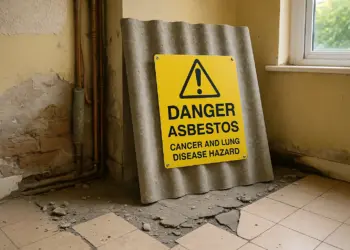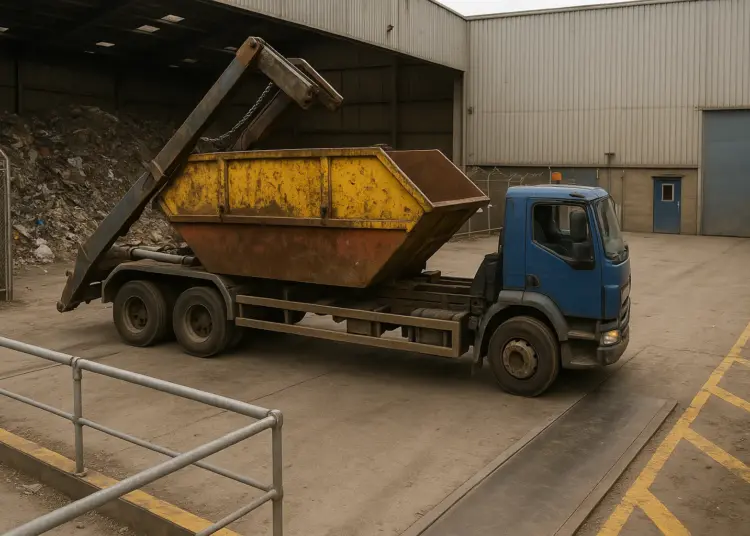Story Highlight
– Biffa Waste fined £2.48 million after worker’s death.
– James Tabiri died from crush injuries in August 2023.
– HSE found poor monitoring of safety measures.
– Workers bypassed safe pedestrian routes on site.
– Incident highlights risks of reversing vehicles in workplaces.
Full Story
A significant penalty has been imposed on a waste management firm following a tragic incident in which a worker lost his life at a facility in Bradford. Biffa Waste Services Ltd has been fined £2.48 million after a thorough investigation into the circumstances surrounding the death of James Tabiri, a 57-year-old sort line operative, who was struck by a reversing skip wagon on 10 August 2023.
Mr. Tabiri, who was making his way to the office via the weighbridge, was unfortunately knocked down by the vehicle. The subsequent injuries he sustained from the rear wheels of the wagon were fatal, and he died as a result. This incident has brought to light severe concerns regarding the safety measures in place at the waste transfer station.
The Health and Safety Executive (HSE) initiated an investigation into the accident and discovered that Biffa Waste Services Ltd failed to adequately monitor and assess the control measures designed to protect pedestrians working near vehicles. Evidence gathered from CCTV footage revealed a troubling trend; it was observed that employees commonly disregarded designated pedestrian routes, frequently opting to climb over barriers meant to safeguard them from vehicle movements.
Legally, employers are obligated to ensure that traffic routes on their premises facilitate safe movement without jeopardising the well-being of their workers. Guidance for managing vehicle operations in workplaces is available from HSE. The regulatory body highlighted that nearly 25% of workplace transport fatalities involve incidents during reversing operations, underscoring the inherent risks associated with such activities.
In light of these findings, Biffa Waste Services Ltd, located on Coronation Road in Cressex, High Wycombe, pleaded guilty to violating Regulation 5(1) of the Management of Health and Safety at Work Regulations 1999. The court hearing took place at Leeds Magistrates’ Court on 15 October 2025, where the company was mandated to pay the hefty fine alongside additional costs totalling £5,768.06.
Elliot Archer, an inspector with the HSE, expressed his dismay at the preventability of the incident. He remarked, “This incident was easily avoidable. Control measures were in place to allow pedestrians and vehicles to move safely, but a lack of monitoring and supervision allowed poor working practices to develop between the workers on site.” He went on to describe a concerning disregard for health and safety protocols, comparing the operational environment of the site to that of a playground—dangerous and inappropriate for a locations dealing with heavy machinery.
Mr. Archer’s commentary serves as a stark reminder to the waste management sector about the critical need for vigilance in addressing transport-related hazards within the workplace. He cautioned that even when safety measures are ostensibly in place to segregate pedestrian paths from vehicle routes, ongoing oversight and adherence to these protocols are vital for ensuring worker safety.
The prosecution was managed by HSE enforcement lawyer Arfaq Nabi, with contributions from paralegal officer Melissa Wardle. The substantial penalty levied against Biffa Waste Services Ltd signifies not merely a punitive measure but also a call to action for the entire industry.
The HSE is committed to safeguarding the health and safety of individuals in workplaces nationwide, emphasising the importance of rigorous safety standards and regulations. For those seeking further information on workplace safety legislation, the HSE provides ample resources aimed at ensuring safer operational practices.
This case illustrates the tragic consequences of neglected safety measures and highlights the urgent necessity for all employers to foster a culture that prioritises the health and safety of their workforce. With the potential for similar incidents, all sectors, particularly high-risk industries such as waste management, should reflect on this incident as a catalyst for improvement in their operational safety frameworks.























This tragic outcome was entirely preventable. It highlights the need for active supervision, robust vehicle route control, and a strong safety culture where workers are empowered to stop unsafe practices. Regular audits, clear physical segregation between vehicles and pedestrians, and routine review of safety procedures would help prevent similar incidents. Employers must treat safety as a core duty not an optional extra.
This tragedy is a painful reminder that safety cannot be left to chance. Effective supervision and active monitoring of safe systems of work are essential, especially where vehicles operate near pedestrians. Simple controls such as segregated routes, physical barriers, clear signage and strict supervision must be enforced and regularly reviewed to prevent people bypassing safe routes. Leadership must ensure safety procedures are not only documented but followed, with staff engaged, trained and empowered to stop unsafe acts. Regular audits, near miss reporting and prompt corrective action can save lives.
This tragic death underlines how essential constant vigilance and active enforcement of safety procedures are on site. Allowing staff to bypass designated walkways and failing to manage vehicle movements are basic control failures that should never occur. Those in charge must ensure safe systems of work are designed, implemented and checked regularly and that everyone on site understands and follows them. The fine reflects the seriousness of the failings but the priority must be preventing another avoidable loss of life.
This is a tragic but preventable outcome. Firms must ensure safe systems of work are not just written down but actively enforced and monitored. Clear separation of vehicles and pedestrians, robust vehicle movement controls, and effective supervision are fundamental. Regular reviews of procedures and worker engagement on safety can stop complacency and save lives. Enforcement and meaningful learning from incidents like this are essential to prevent repetition.